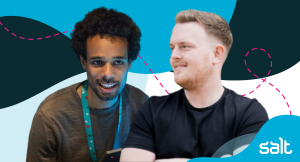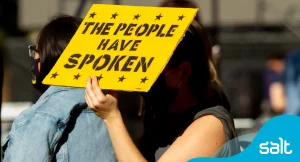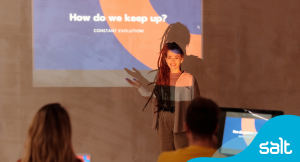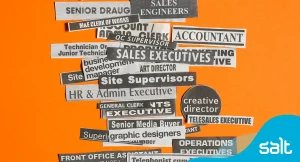Upload your CV
Upload your CV to our database.
Please let us know where you are, or where you would like to be in the world so we can point you in the right direction.

Global digital recruitment leader Salt has announced a strategic partnership with The McCormick Group, one of Washington, D.C.’s most established Executive Search firms, to enhance access to top-tier talent across the U.S. market.

The conversation has moved on. It’s no longer about whether AI belongs in hiring, it’s about how we use it, and who’s responsible for the outcomes it drives.

Barbara Emerson, APAC Regional Business Operations Director at New Balance, discusses leadership and encouraging women to take pathways in operations roles.

Andy Fairey, Head of E-commerce at BullyBillows, shares his journey from launching digital platforms in football to leading e-commerce transformation across healthcare, retail, and now pet tech.

Be approachable A knowledgeable Billy-no-mates is only as good as the number of hours they have in their day. Analysing data is flat out complex and an entire team should be able to ask the analyst relevant questions, about what and where the data came from to facilitate the process. Fearless Indiana Jones […]

As SEO continues to evolve, knowing how to hire an SEO specialist has become just as important as having a strategy in place.

Alexander Fadahunsi, Senior Manager of CRM at Etsy, shares his journey across industries and continents, offering insights into building high-impact CRM strategies.

The gender equity conversation has reached a critical moment. For years, women have been told to “lean in” and work twice as hard to break glass ceilings. But our 2025 poll results suggest the system still isn’t leaning back

Curate the marketing skills that’ll draw the eyes of your dream employers and discover the skills to build your ultimate team.

There are pros and cons to being a contractor or freelancer – and it can help you decide to consider these before you take the leap and work for yourself!

For years, job titles have been seen as a convenient way to simplify recruitment, helping to scan CVs, compare applicants, and gauge experience. But the truth is, job titles rarely paint the full picture.

Who gets hired, how jobs are created, and which skills are valued are not just determined by individual effort – they’re dictated by global economic forces, corporate interests, and technological shifts.
Upload your CV to our database.
Please let us know where you are, or where you would like to be in the world so we can point you in the right direction.